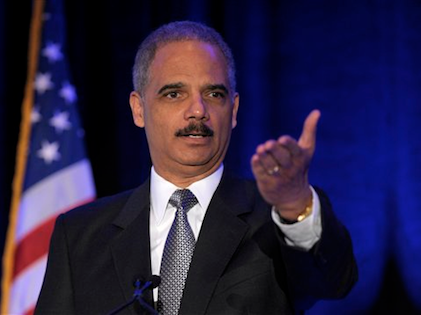
Federal courts could soon decide a fight between Congress and Attorney General Eric Holder on the Operation Fast and Furious gun-running scandal. If Republicans persevere, this is a battle that Holder should lose in what would be a humiliating defeat for President Barack Obama.
Most Americans have now heard that our government allowed drug cartels to illegally smuggle thousands of guns from the U.S. into Mexico. The National Rifle Association has relentlessly pursued the White House and Department of Justice (DOJ) about Fast and Furious for over a year, and the massive gun-rights organization has only increased its focus in recent months.
But in addition to decrying the gun-smuggling activity, the NRA has been pushing for information regarding who knew what in the administration, and any related political objectives being pursued by Team Obama.
Chris Cox, the NRA’s chief lobbyist, declared at the organization’s annual meeting in April: “The Obama administration poured gasoline on the raging fire of murder and mayhem on our southwest border. But to cover their tracks they tried to blame NRA members and the Second Amendment.”
Cox then added, “According to their internal emails, it was all to advance their gun-control agenda.”
Although the silence of the Democrat-controlled Senate could give the impression that Harry Reid, Dick Durbin, Chuck Schumer, and Pat Leahy want to pretend that Fast and Furious never happened, the Republican-led House picked up on the NRA’s charges and launched an aggressive investigation.
Rep. Darrell Issa, chairman of the House Government Reform and Oversight Committee, is leading the charge against Holder in Congress. Yet Holder is refusing to release literally tens of thousands of pages of documents, or provide testimony regarding high-ranking officials potentially involved in this scandal that resulted in the death of multiple federal agents. So now Issa is pursuing a contempt citation against Holder, which can result in fines or even (unlikely) imprisonment.
Here’s the process for how the fight will unfold, if Issa continues to move forward:
Issa’s committee will vote to hold Eric Holder in contempt of Congress. Then the contempt citation goes to the House floor for a vote, because only the full House or Senate can hold someone in contempt. It then goes to the U.S. attorney for the District of Columbia to launch a criminal prosecution in federal court.
The problem, of course, is that federal prosecutors are part of DOJ. So all 93 U.S. attorneys work for–that’s right–Attorney General Holder. It’s a foregone conclusion that Ronald Machen–the U.S. attorney for D.C.–is not going to try to send his boss to prison. This is especially true given that Machen is a rising star among Democrats in the legal community with a perfect résumé, making him competitive for a top position at DOJ or perhaps a federal judgeship.
So then the House must bring a lawsuit of its own. The Supreme Court held in the 1997 case Raines v. Byrd that only the full House can initiate such a suit. So there would be another House vote, this time authorizing Issa to file a civil suit in D.C.’s federal district court on behalf of the House, seeking a court order to compel Holder to provide all the testimony and documents Issa has subpoenaed.
The only defense Holder can assert is to say that these documents are protected by executive privilege. That’s the doctrine that the president and his subordinates are independent of Congress, and that certain information can be kept secret to enable each president and his administration to do their jobs effectively. Though often asserted when information is sought regarding the president’s confidential conversations or for decisions involving military decisions or foreign diplomacy, executive privilege can be attempted whenever someone in an administration does not want to comply with a congressional subpoena.
But Holder will lose that legal fight if Issa and House Republicans persist in pursuing this investigation, as they should. This is in part because there are two types of executive privilege, as I explain in an academic publication. The first is the presidential communications privilege, which shields conversations a president has with his advisors. It’s rooted in the Constitution’s separation of powers, and allows every president to receive candid advice on how to discharge his duties.
That privilege only extends to communications directly involving the president, however, so instead Holder can only assert the second type of executive privilege, called the deliberative process privilege. It’s a common-law doctrine that is not found in the Constitution, and as such is a much weaker defense. Two centuries of legal precedent strongly suggest that if Holder tries claiming that this weaker form of executive privilege empowers him to refuse to answer Congress, the courts will smack Holder down–hard.
No doubt Holder would appeal his loss to the D.C. Circuit appeals court, where he should lose again. If Obama is reelected but Republicans keep the House, then this fight could eventually even reach the Supreme Court.
Sooner or later, the truth will come out. And then all Americans–including the four million members of the NRA–will learn the full truth of this modern version of Iran-Contra, a scandal that could bring down Obama’s attorney general, and possibly even his presidency.
Breitbart legal contributor Ken Klukowski is on faculty at Liberty University School of Law, and author of “Making Executive Privilege Work” published by Cleveland State Law Review.

COMMENTS
Please let us know if you're having issues with commenting.